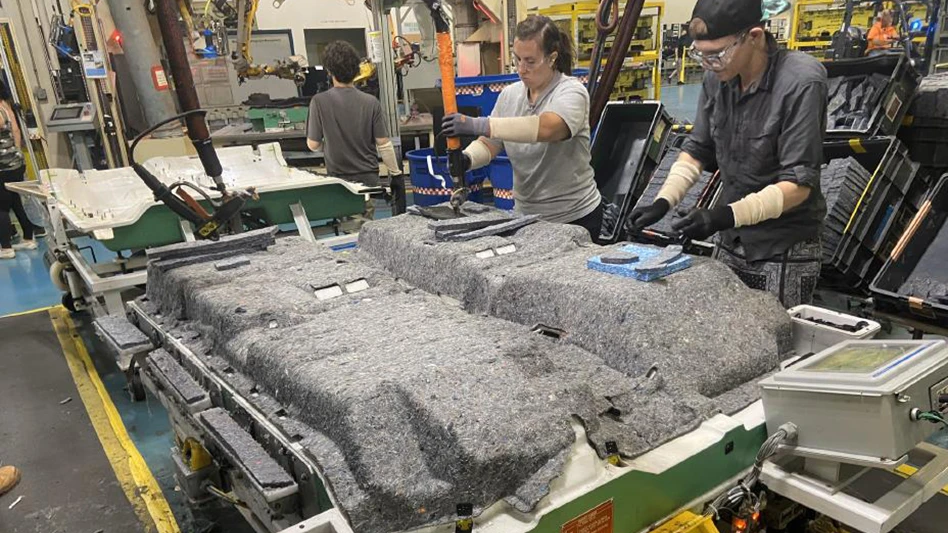
Photo courtesy of American Honda Motor Co. Inc.
The Marysville, Ohio-based manufacturing operations of American Honda Motor Co. Inc. has put in place a uniform recycling initiative designed to convert discarded uniforms into a sound-absorbing insulation material used in Honda and Acura vehicles.
The initiative is part of Honda's “Triple Action to Zero” approach that focuses on resource circulation to make new products from 100 percent sustainable materials by 2050.
In the program, discarded uniforms are collected from its facilities in Alabama, Indiana, North Carolina and Ohio then shredded into fibers and repurposed as insulation components in newly assembled vehicles.
The company estimates the program is diverting about 45,000 pounds (22.5 tons) of uniforms from landfills each month, or about 270 tons per year.
Honda says it has established its global Triple Action to Zero approach with the goal of achieving carbon neutrality for all products and corporate activities, with an emphasis on “clean energy” and resource circularity.
“To achieve our Triple Zero goal of 100 percent sustainable material use, we need to take every possible opportunity to recycle materials at end of life for reuse in our products, thereby minimizing our utilization of virgin materials,” says Negar Gilsinger, manager of resource circulation for American Honda Motor. “By maximizing end-of-life material recycling, we are giving our uniforms a second life in Honda and Acura vehicles.”
Also involved in the uniform recycling are suppliers Aramark, based in Philadelphia, and Cintas Corp., based in Ohio, as well as Illinois-based insulation components supplier UGN Automotive and South Carolina-based textile recycler Leigh Fibers Inc.
Material made with the recycled uniforms currently can be found in five different insulator parts on all nine Honda and four Acura models made in North America. In the future, Honda plans to expand the uniform recycling program to other facilities in North America, the company says.
“Collaborating with Honda suppliers in the uniform recycling program has brought great value to our supply chain sustainability efforts,” says Rob Long, senior procurement specialist with Honda. “As Honda works to advance sustainability, we appreciate our suppliers’ efforts to innovate their business operations to reduce waste and give new life to our Honda uniforms.”
The company estimates more than 190 tons of uniforms have been recycled since the program launched at the end of 2021.
While Honda suppliers Aramark and Cintas evaluate, wash and circulate for reuse uniforms they collect, when uniforms are designated unfit for reuse they are baled and sent to Leigh Fibers to reprocess and blend materials to help create the insulation material.
At the Leigh Fibers facility, the uniforms are shredded into material that meets the required fiber grade for use as vehicle insulators. Zippers and buttons from the uniforms are extracted and collected so that no metal or plastic goes through the shredding process. Then the fabric gets blended into mixed fibers and tested to ensure the fiber material meets the fiber length requirements. The newly reprocessed fibers are then packaged and delivered to insulation supplier UGN.
UGN blends, consolidates and trims the fibers into material that is molded into insulation and returned to Honda auto manufacturing plants as new vehicle components. Typically, UGN creates insulation from postindustrial fibers, which are sourced from textile companies, and polyester sourced from recycled water bottles. Honda says the uniform recycling program marks the first time Honda and UGN are using postconsumer textile waste for sustainable insulation material.
“It is part of UGN’s history and culture to maximize recycled content in our parts, reduce landfill by recycling our own byproducts, and promote circular, mono-material technologies that enable end-of-life vehicle recycling,” says Pranav Singh, an executive with UGN Automotive. “Reusing Honda uniforms contributes to these efforts by increasing the amount of recycled materials available for insulators and opens the door to other postconsumer textile waste projects.”
Other recycling-related efforts undertaken by Honda include working with suppliers to transform postindustrial textile scrap, such as fibers from denim, into vehicle insulation and absorption material.
In collaboration with insultation supplier UGN, Honda annually reuses approximately 2,800 tons of recycled postindustrial textile scrap, which it says is equivalent to 5.6 million pairs of jeans, and 3,000 tons of postconsumer PET bottles, which it says is equivalent to about 6 million water bottles.
Latest from Recycling Today
- BMW Group, Encory launch 'direct recycling’ of batteries
- Loom Carbon, RTI International partner to scale textile recycling technology
- Goodwill Industries of West Michigan, American Glass Mosaics partner to divert glass from landfill
- CARI forms federal advocacy partnership
- Monthly packaging papers shipments down in November
- STEEL Act aims to enhance trade enforcement to prevent dumping of steel in the US
- San Francisco schools introduce compostable lunch trays
- Aduro graduates from Shell GameChanger program





